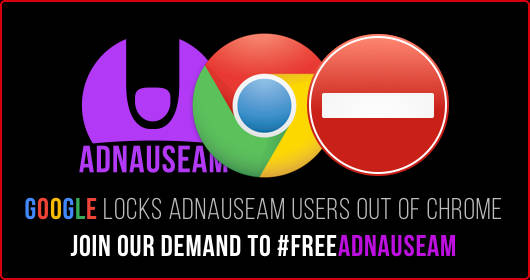| Fear And Loathing In The App Store 17 - The Strange Case Of AdNauseam |
| Written by Mike James | |||
| Monday, 30 January 2017 | |||
|
Google has just banned a Chrome plugin and removed it from all existing installations. Using it can get your You Tube channel banned. Google really does not like this software. Why?
I'm not going to go over all of the reasons why app stores are bad, but they certainly restrict our freedom as programmers. If you programmed in the era of the PC or before you could be a member of the last generation of programmers to know the freedom to create any program you care to think of. What is more, there is evidence that App stores also seem to restrict the freedom of the end user. Google has just banned an ad-blocker called AdNauseam from the Chome Web Store as from the start of the year. As this is a Chrome plugin Google can disable any copies already installed in Chrome - that is the ban is retrospective. This ability to remove an application is supposed to be a protection mechanism for users, allowing malware that has just been detected to be removed from existing installations. However, in this case AdNauseam isn't malware and users might well want to keep using it. You might well think, why the fuss? Or you might think that as Google is an advertising company why would it ban an adblocker which would block its own ads? Also as Google doesn't block other adblockers, why this one? The statement on the AdNauseam site gives some clues: Since 2014 tens of thousands of users have installed the free, open-source AdNauseam extension to protect themselves against online advertising surveillance. AdNauseam, a not-for-profit, research-based privacy tool, hides and clicks every tracking ad that it identifies in order to resist the opaque collection, analysis and monetization of private user data, and to challenge the intrusive and unethical business model that currently dominates the web. The main clue is in the statement "hides and clicks every tracking ad that it identifies". It basically attempts to hide the user in a blizzard of machine generated clicks. Of course, these clicks are recorded by Google or any ad agency as potentially valid user clicks and this results in the advertiser being billed, Google getting paid and handing out a tiny proportion to the publisher for doing all the work. Sounds good from everyone's point of view apart from the advertisers. If this behaviour spread then it would eventually poison Google's business as advertisers would no longer trust that a click was a click. So how did Google justify the ban? "We wrote Google to ask the reason for this sudden move and they responded that AdNauseam had breached the Web Store’s terms of service, stating that “An extension should have a single purpose that is clear to users…”, but providing no detail as to what the multiple purposes might be." It goes on to nail the nature of the problem very nicely: We can certainly understand why Google would prefer users not to install AdNauseam, as it directly opposes their core business model, but the Web Store’s Terms of Service do not (at least thus far) require extensions to endorse Google’s business model. Moreover, this is not the justification cited for the software’s removal. Notice the important point - this application has been removed because it goes against Google's business model. If you think that this is true then there is cause for concern. A condition like "apps must not damage Googe's potential revenue" might not be very acceptable. It also raises the question of why Google doesn't ban ad blockers in general - after all they very much impact Google's bottom line? Perhaps Google fears a public outcry if they blocked something so popular. The AdNauseam team has submitted an updated description of the addin, which it claims meets the objections, and argues that Google should reinstate the app . This seems unlikely to happen. The last word goes to the AdNauseam team: Finally, while we hope that Google will lift these unwarranted sanctions for AdNauseam, it highlights a much more serious problem for Chrome users. It is frightening to think that at any moment Google can quietly make your extensions and data disappear, without so much as a warning. Today it is your privacy tool, tomorrow it is your photo album or password manager. Google’s grip over Chrome users is a forceful one, but brave users can find instructions for installing AdNauseam without having to ask Google's permission. More InformationAdNauseam banned from the Google Web Store
Fear and Loathing In The App Store
Epic Games CEO Finally Notices That UWP Apps Are A Walled Garden To be informed about new articles on I Programmer, sign up for our weekly newsletter, subscribe to the RSS feed and follow us on Facebook or Linkedin.
Comments
or email your comment to: comments@i-programmer.info |
|||
| Last Updated ( Monday, 30 January 2017 ) |


